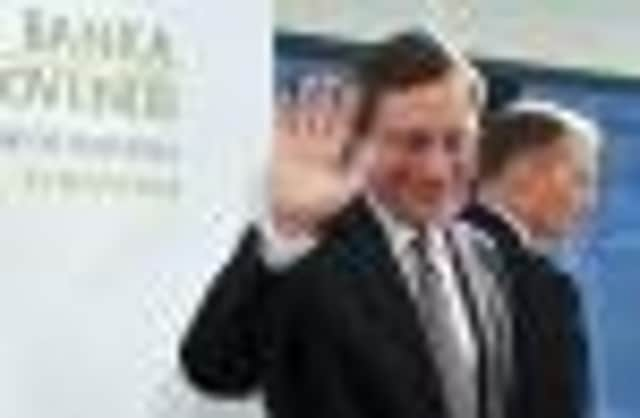Mario Draghi claims success for ECB’s bond buying to ease euro woes


Mario Draghi, speaking after the ECB kept interest rates on hold at 0.75 per cent, said the central bank was ready to buy troubled eurozone bonds when conditions were right, and praised Spain for the “significant progress” it has made in bringing its finances into order, although more work was needed.
Expectations that Spanish prime minister Mariano Rajoy will request a eurozone rescue package before the end of the year lowered Spain’s borrowing costs at yesterday’s auction on €4 billion (£3.2bn) in government bonds. The yield on bonds due in 2014 dropped to just under 3.3 per cent, down from the 5.2 per cent seen in July.
Advertisement
Hide AdAdvertisement
Hide AdCraig Erlam, market analyst at Alpari, said: “Any conditionality linked to a bail-out will be agreed upon by the other eurozone governments and International Monetary Fund involvement will be sought after. This isn’t a huge surprise and if anything was Draghi’s ‘get out of jail free’ card when it came to questions relating to a Spanish bail-out.”
On Wednesday, Portugal returned to bond markets for the first time since it sought a €78bn bail-out last year, swapping short for longer-dated debt to buy time to fix its finances.
However, Draghi said the ECB will not buy the bonds of already bailed-out countries – including Portugal – under its new crisis plan because they do not have full access to bond markets.
Many economists expect the ECB to cut interest rates to 0.5 per cent before the end of the year, although Draghi said policymakers did not discuss the possibility of lowering rates in the near term at yesterday’s meeting.
Howard Archer, chief UK and European economist at IHS Global Insight, said the central bank’s reluctance to take rates lower was probably fuelled by a recent increase in eurozone consumer prices inflation, which rose to 2.7 per cent in September, up from 2.6 per cent the previous month, because of higher oil prices and an increase in Spanish VAT.
The Bank of England also kept interest rates on hold at 0.5 per cent yesterday and maintained its current quantitative easing (QE) programme at £375bn.
Royal Bank of Scotland’s head of group economics, Stephen Boyle, said he would have been “flabbergasted” if the Bank had announced any changes in monetary policy this month, and he expects it will wait until November at the earliest before making a move.
Boyle said: “By then it will know how Funding for Lending and its latest burst of quantitative easing have affected conditions and whether they need to do more.”
Advertisement
Hide AdAdvertisement
Hide AdRob Harbron, economist at the Centre for Economics and Business Research, agreed that the lack of movement from the Bank of England had been widely expected and “next month could yield a change in the current stance”.
The current programme of £375bn in asset purchases is due to be completed in November and some of the Bank’s monetary policy committee members felt in September that further stimulus would be needed in due course, Harbron said.
He added: “We expect the Bank of England to purchase an additional £50bn of assets by the end of the year, taking their total to £425bn.”
European Central Bank interest rate frozen at 0.75%
3.3% yield on Spanish bonds, down from 5.2% in July
Eurozone inflation rate rose to 2.7% in September
Bank of England keeps interest rates at 0.5% and quantitative easing at£375bn